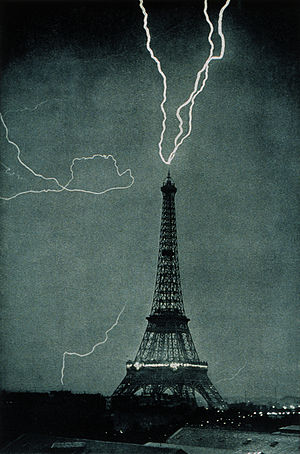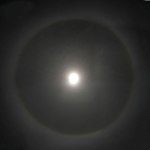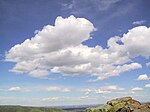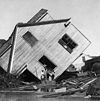Portal:Weather
The weather portal
Weather is the state of the atmosphere, describing for example the degree to which it is hot or cold, wet or dry, calm or stormy, clear or cloudy. On Earth, most weather phenomena occur in the lowest layer of the planet's atmosphere, the troposphere, just below the stratosphere. Weather refers to day-to-day temperature, precipitation, and other atmospheric conditions, whereas climate is the term for the averaging of atmospheric conditions over longer periods of time. When used without qualification, "weather" is generally understood to mean the weather of Earth.
Weather is driven by air pressure, temperature, and moisture differences between one place and another. These differences can occur due to the Sun's angle at any particular spot, which varies with latitude. The strong temperature contrast between polar and tropical air gives rise to the largest scale atmospheric circulations: the Hadley cell, the Ferrel cell, the polar cell, and the jet stream. Weather systems in the middle latitudes, such as extratropical cyclones, are caused by instabilities of the jet streamflow. Because Earth's axis is tilted relative to its orbital plane (called the ecliptic), sunlight is incident at different angles at different times of the year. On Earth's surface, temperatures usually range ±40 °C (−40 °F to 104 °F) annually. Over thousands of years, changes in Earth's orbit can affect the amount and distribution of solar energy received by Earth, thus influencing long-term climate and global climate change.
Surface temperature differences in turn cause pressure differences. Higher altitudes are cooler than lower altitudes, as most atmospheric heating is due to contact with the Earth's surface while radiative losses to space are mostly constant. Weather forecasting is the application of science and technology to predict the state of the atmosphere for a future time and a given location. Earth's weather system is a chaotic system; as a result, small changes to one part of the system can grow to have large effects on the system as a whole. Human attempts to control the weather have occurred throughout history, and there is evidence that human activities such as agriculture and industry have modified weather patterns.
Studying how the weather works on other planets has been helpful in understanding how weather works on Earth. A famous landmark in the Solar System, Jupiter's Great Red Spot, is an anticyclonic storm known to have existed for at least 300 years. However, the weather is not limited to planetary bodies. A star's corona is constantly being lost to space, creating what is essentially a very thin atmosphere throughout the Solar System. The movement of mass ejected from the Sun is known as the solar wind. (Full article...)
Selected article

The atmosphere of Jupiter is the largest planetary atmosphere in the Solar System. It is mostly made of molecular hydrogen and helium; other chemical compounds are present only in small amounts and include methane, ammonia, hydrogen sulfide and water. Although water is thought to reside deep in the atmosphere, its directly measured concentration is very low. The nitrogen, sulfur, and noble gas abundances in Jupiter's atmosphere exceed solar values by a factor of about three.
The atmosphere of Jupiter lacks a clear lower boundary and gradually transitions into the liquid interior of the planet. From lowest to highest, the atmospheric layers are the troposphere, stratosphere, thermosphere and exosphere. Each layer has characteristic temperature gradients. The lowest layer, the troposphere, has a complicated system of clouds and hazes, comprised of layers of ammonia, ammonium hydrosulfide and water. The upper ammonia clouds visible at Jupiter's surface are organized in a dozen zonal bands parallel to the equator and are bounded by powerful zonal atmospheric flows (winds) known as jets. The bands alternate in color: the dark bands are called belts, while light ones are called zones. Zones, which are colder than belts, correspond to upwellings, while belts mark descending gas. The zones' lighter color is believed to result from ammonia ice; what gives the belts their darker colors is uncertain. The origins of the banded structure and jets are not well understood, though a "shallow model" and a "deep model" exist.
The Jovian atmosphere shows a wide range of active phenomena, including band instabilities, vortices (cyclones and anticyclones), storms and lightning. The vortices reveal themselves as large red, white or brown spots (ovals). The largest two spots are the Great Red Spot (GRS) and Oval BA, which is also red. These two and most of the other large spots are anticyclonic. Smaller anticyclones tend to be white. Vortices are thought to be relatively shallow structures with depths not exceeding several hundred kilometers. Located in the southern hemisphere, the GRS is the largest known vortex in the Solar System. It could engulf two or three Earths and has existed for at least three hundred years.
Jupiter has powerful storms, often accompanied by lightning strikes. The storms are a result of moist convection in the atmosphere connected to the evaporation and condensation of water. They are sites of strong upward motion of the air, which leads to the formation of bright and dense clouds. The storms form mainly in belt regions. The lightning strikes on Jupiter are hundreds of times more powerful than those seen on Earth, and are assumed to be associated with the water clouds.
Recently selected articles: Tropical Storm Allison, Tornado, Cyclone Orson, More...
Did you know (auto-generated) -

- ... that the weather forecast for HD 189733 b is "Westerly winds at 2000 m/s, with molten glass showers"?
- ... that a Michigan TV station rescued and restored a weather ball that had been sitting for years in a scrapyard?
- ... that Japanese actor Kouhei Higuchi prepared for his role on the television drama adaptation of My Personal Weatherman by learning from a weather forecaster?
- ... that MyRadar uses a custom satellite constellation to help forecast the weather?
- ... that in the 1980s, "Sherman Bonner, The Human Thermometer" presented the weather on an Arkansas TV station?
- ... that an attempted British-Norwegian attack on the German battleship Tirpitz was abandoned after two Chariot manned torpedoes were lost due to bad weather?
Selected image

Lightning striking the Eiffel Tower on the night of June 3, 1902. This is one of the earliest photographs of lightning in an urban setting.
Recently selected pictures: Cyclone Catarina, Roll cloud, Hoar frost, More...
More did you know...
...that the Flying river is the name given to the transport of water vapor from the Amazon rainforest to southern Brazil?
...that hurricane shutters are required for all homes in Florida unless impact-resistant glass is used?
...that the Joint Institute for Marine and Atmospheric Research is a combined weather and ocean research institute with the cooperation of the Office of Oceanic and Atmospheric Research and the University of Hawaiʻi?
...that the SS Central America was sunk by a hurricane while carrying more than 30,000 pounds (13,600 kg) of gold, contributing to the Panic of 1857?
...that a hurricane force wind warning is issued by the United States National Weather Service for storms that are not tropical cyclones but are expected to produce hurricane-force winds (65 knots (75 mph; 120 km/h) or higher)?
...that the Automated Tropical Cyclone Forecasting System is a software package for tropical cyclone forecasting developed in 1988 that is still used today by meteorologists in various branches of the US Government?
Recent and ongoing weather
- Wikinews weather portal
- March 26, 2021: Tropical moisture ceases to cause severe floods in South East Australia
- February 19, 2021: Winter storms hammer Texas, fatalities reported
- December 28, 2021: Typhoon Phanfone strikes Philippines
- February 1, 2022: Deadly floods in Brazil after heavy rainfall
- April 15, 2022: South African floods kill at least 300 people
- Weather of 2024
- 2024 Atlantic hurricane season
- 2020–21 North American winter
- 2024 Pacific typhoon season
- Tornadoes of 2024
This week in weather history...
November 18
2014: A major cold snap through much of the US reached its peak, with some temperatures reaching 45 degrees below normal.
November 19
2013: Up to 440 millimetres (17 in) of rain in just 90 minutes caused severe flooding on Sardinia, killing 18 people.
November 20
1996: Hurricane Marco, the longest-lived tropical cyclone ever recorded in the Atlantic Ocean in November, reached its peak intensity while meandering over the Caribbean Sea.
November 21
1992: Cyclone Forrest, which had prompted unprecedented evacuations in Bangladesh before veering eastward, made landfall in northwestern Myanmar causing relatively minor damage.
November 22
2020: Cyclone Gati, the strongest tropical cyclone on record to strike Somalia, made landfall near Hafun, killing 9 people.
November 23
1984: An unusually strong early-season Nor'easter reached its peak intensity off the coast of Florida.
November 24
1703: An intense European windstorm began to affect southern England and the English Channel. This storm or series of storms would last for more than a week, killing as many as 15,000 at sea.
Selected biography
Sir William Napier Shaw FRS (4 March 1854 – 23 March 1945) was a British meteorologist. He introduced the tephigram, a diagram for evaluating convective instability in the atmosphere. He also served as president of the International Meteorological Committee and Royal Meteorological Society. (Full article...)
Previously selected biographies: Johannes Letzmann, Ted Fujita, More...
Related portals
Quality content
Other candidates:
- Featured Article Review: 2005 Atlantic hurricane season (Discussion)
- Featured List Removal Candidate: List of storms in the 2005 Atlantic hurricane season (Discussion)
Subcategories
WikiProjects
The scope of WikiProject Weather is to have a single location for all weather-related articles on Wikipedia.
WikiProject Meteorology is a collaborative effort by dozens of Wikipedians to improve the quality of meteorology- and weather-related articles. If you would like to help, visit the project talk page, and see what needs doing.
WikiProject Severe weather is a similar project specific to articles about severe weather. Their talk page is located here.
WikiProject Tropical cyclones is a daughter project of WikiProject meteorology. The dozens of semi-active members and several full-time members focus on improving Wikipedia's coverage of tropical cyclones.
WikiProject Non-tropical storms is a collaborative project to improve articles related to winter storms, wind storms, and extratropical cyclones.
Wikipedia is a fully collaborative effort by volunteers. So if you see something you think you can improve, be bold and get to editing! We appreciate any help you can provide!
Associated Wikimedia
The following Wikimedia Foundation sister projects provide more on this subject:
-
Commons
Free media repository -
Wikibooks
Free textbooks and manuals -
Wikidata
Free knowledge base -
Wikinews
Free-content news -
Wikiquote
Collection of quotations -
Wikisource
Free-content library -
Wikiversity
Free learning tools -
Wiktionary
Dictionary and thesaurus

































